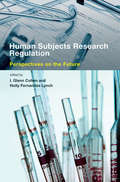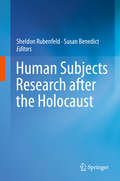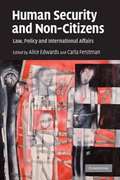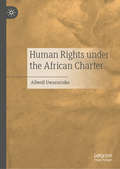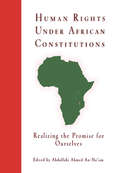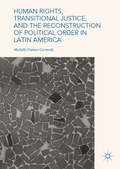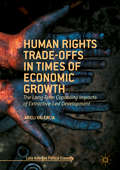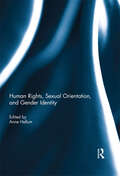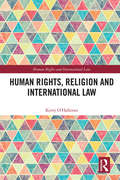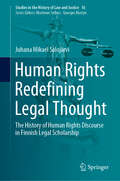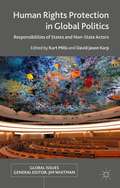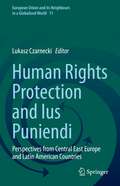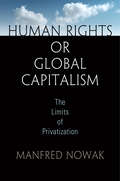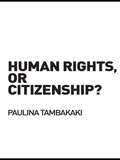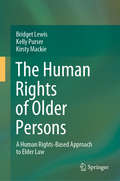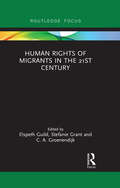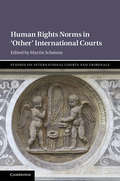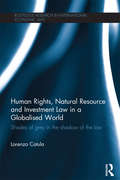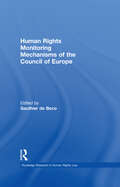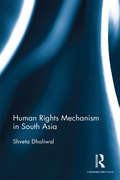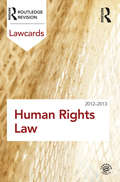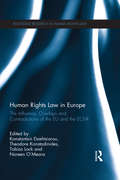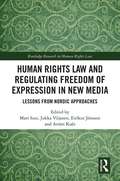- Table View
- List View
Human Subjects Research Regulation: Perspectives on the Future (Basic Bioethics)
by Holly Fernandez Lynch I. Glenn CohenExperts from different disciplines offer novel ideas for improving research oversight and protection of human subjects.The current framework for the regulation of human subjects research emerged largely in reaction to the horrors of Nazi human experimentation, revealed at the Nuremburg trials, and the Tuskegee syphilis study, conducted by U.S. government researchers from 1932 to 1972. This framework, combining elements of paternalism with efforts to preserve individual autonomy, has remained fundamentally unchanged for decades. Yet, as this book documents, it has significant flaws—including its potential to burden important research, overprotect some subjects and inadequately protect others, generate inconsistent results, and lag behind developments in how research is conducted. Invigorated by the U.S. government's first steps toward change in over twenty years, Human Subjects Research Regulation brings together the leading thinkers in this field from ethics, law, medicine, and public policy to discuss how to make the system better. The result is a collection of novel ideas—some incremental, some radical—for the future of research oversight and human subject protection.After reviewing the history of U.S. research regulations, the contributors consider such topics as risk-based regulation; research involving vulnerable populations (including military personnel, children, and prisoners); the relationships among subjects, investigators, sponsors, and institutional review boards; privacy, especially regarding biospecimens and tissue banking; and the possibility of fundamental paradigm shifts.ContributorsAdam Braddock, Alexander Morgan Capron, Ellen Wright Clayton, I. Glenn Cohen, Susan Cox, Amy L. Davis, Hilary Eckert, Barbara J. Evans, Nir Eyal, Heidi Li Feldman, Benjamin Fombonne, Elisa A. Hurley, Ana S. Iltis, Gail H. Javitt, Greg Koski, Nicole Lockhart, Holly Fernandez Lynch, Michael McDonald, Michelle N. Meyer, Osagie K. Obasogie, Efthimios Parasidis, Govind Persad, Rosamond Rhodes, Suzanne M. Rivera, Zachary M. Schrag, Seema K. Shah, Jeffrey Skopek, Laura Stark, Patrick Taylor, Anne Townsend, Carol Weil, Brett A. Williams, Leslie E. Wolf
Human Subjects Research after the Holocaust
by Sheldon Rubenfeld Susan Benedict"An engaging, compelling and disturbing confrontation with evil . . . a book that will be transformative in its call for individual and collective moral responsibility. " - Michael A. Grodin, M. D. , Professor and Director, Project on Medicine and the Holocaust, Elie Wiesel Center for Judaic Studies, Boston University Human Subjects Research after the Holocaust challenges you to confront the misguided medical ethics of the Third Reich personally, and to apply the lessons learned to contemporary human subjects research. While it is comforting to believe that Nazi physicians, nurses, and bioscientists were either incompetent, mad, or few in number, they were, in fact, the best in the world at the time, and the vast majority participated in the government program of "applied biology. " They were not coerced to behave as they did--they enthusiastically exploited widely accepted eugenic theories to design horrendous medical experiments, gas chambers and euthanasia programs, which ultimately led to mass murder in the concentration camps. Americans provided financial support for their research, modeled their medical education and research after the Germans, and continued to perform unethical human subjects research even after the Nuremberg Doctors' Trial. The German Medical Association apologized in 2012 for the behavior of its physicians during the Third Reich. By examining the medical crimes of human subjects researchers during the Third Reich, you will naturally examine your own behavior and that of your colleagues, and perhaps ask yourself "If the best physicians and bioscientists of the early 20th century could do evil while believing they were doing good, can I be certain that I will never do the same?"
Human Security and Non-Citizens: Law, Policy and International Affairs
by Alice Edwards Carla FerstmanThe past decades have seen enormous changes in our perceptions of 'security', the causes of insecurity and the measures adopted to address them. Threats of terrorism and the impacts of globalisation and mass migration have shaped our identities, politics and world views. This volume of essays analyses these shifts in thinking and, in particular, critically engages with the concept of 'human security' from legal, international relations and human rights perspectives. Contributors consider the special circumstances of non-citizens, such as refugees, migrants, and displaced and stateless persons, and assess whether, conceptually and practically, 'human security' helps to address the multiple challenges they face.
Human Rights under the African Charter
by Allwell UwazuruikeThis book critically examines the civil, political, socioeconomic, and group rights protected under the African Charter and its Protocol on women’s rights. It then examines the institutional protection of these rights through the African Commission and African Court. The book builds on the concept of regionalism within Africa and the recent drive for finding “African solutions to African problems” by tracing the development of human rights within Africa and assessing the effectiveness of Africa’s core regional human rights institutions. In turn, it critically analyses the obstacles to the full implementation of human rights in Africa such as the lack of political will, jurisdictional issues, lack of resources and funding, poverty, illiteracy, corruption, and customary practices that violate human rights. In closing, the book discusses possible solutions to these problems.
Human Rights Under African Constitutions
by Abdullahi Ahmed An-Na'imSome of the most massive and persistent violations of human rights occur in African nations. In Human Rights Under African Constitutions: Realizing the Promise for Ourselves, scholars from a wide range of fields present a sober, systematic assessment of the prospects for legal protection of human rights in Africa. In a series of detailed and highly contextual studies of Ethiopia, Ghana, Guinea, Morocco, Mozambique, Nigeria, Rwanda, Senegal, South Africa, Sudan, and Uganda, experts seek to balance the socioeconomic and political diversity of these nations while using the same theoretical framework of legal analysis for each case study.Standards for human rights protection can be realized only through direct and strong support from a nation's legal and political institutions. The contributors to this volume uniformly conclude that a well-informed and motivated citizenry is the most powerful force for creating the political will necessary to effect change at the national level. In addition to a critical evaluation of the current state of human rights protection in each of these African nations, the contributors outline existing national resources available for protecting human rights and provide recommendations for more effective and practical use of these resources.
Human Rights, Transitional Justice, and the Reconstruction of Political Order in Latin America
by Michelle Frances CarmodyIn Argentina and elsewhere in Latin America, decades after the fall of authoritarian regimes in the 1970s, transitional justice has proven to be anything but transitional—it has become a cornerstone of state policy and a powerful tool of state formation. Contextualizing cultural and political shifts in Argentina after the 1976 military coup with comparisons to other countries in the Southern Cone, Michelle Frances Carmody argues that incorporating human rights practices into official policy became a way for state actors to both build the authority of the state and manage social conflict, a key aim of post-Cold War democracies. By examining the relationship between transitional justice and the Latin American political order, this book illuminates overlooked dimensions of state formation in the age of human rights.
Human Rights Trade-Offs in Times of Economic Growth: The Long-Term Capability Impacts of Extractive-Led Development (Latin American Political Economy)
by Areli ValenciaThis book uncovers a historical dependency on smelting activities that has trapped inhabitants of La Oroya, Peru, in a context of systemic lack of freedom. La Oroya has been named one of the most polluted places on the planet by the US Blacksmith Institute. Residents face the dilemma of whether to defend their health or to preserve job stability at the local smelter, the main source of toxic pollution in town. Valencia unpacks this paradoxical human rights trade-off. This context, shaped by social, historical, political, and economic factors, increases people’s vulnerabilities and decreases their ability to choose, resulting in residents' trading off their right to health in order to work. This book shows the deep connection of this local dilemma to the country’s national paradox, arising out of Peru's vision of natural resource extraction as the main path to secure economic growth for the entire country at the expense of some groups.
Human Rights Struggles in Twentieth-century France: The League of the Rights of Man and Causes Célèbres (Palgrave Studies in the History of Social Movements)
by Max LikinThis book provides an introduction to human rights controversies in twentieth-century France, from the Dreyfus Affair at the beginning of the century, to the arguments over women and immigrants’ rights at its end. Using the Ligue des Droits de L’Homme (LDH) - or the League of the Rights of Man - as a narrative thread for this chronological study, the book tracks the gradual expansion of human rights in France in the wake of the two world wars, the Algerian quagmire and decolonisation more generally. Examining the capital role of the LDH whilst also highlighting the role of individuals and key activists, the book helps us to contextualise the quandaries faced by unseen minorities, particularly colonial subjects and women. The analysis also demonstrates the influence of French human rights activism on key international documents of human rights law, such as the Universal Declaration of Human Rights. The LDH occupies a central place in French justice debates and is therefore an ideal template to analyse the rising influence of humanitarianism and crimes against humanity in French causes célèbres from the 1970s onwards. However, the author goes further to look beyond the LDH and even France itself, offering wide-ranging surveys of dominant rights issues across Europe at any given period. Drawing on extensive research and interviews with key members of the LDH, this book provides an accessible overview of human rights struggles in twentieth-century France.
Human Rights, Sexual Orientation, and Gender Identity
by Anne HellumHow human rights principles, like the right to gender identity, freedom, integrity and equality, respond to the concerns of different groups of adults and children who experience gender harm due to the binary conception of sexuality and gender identity is the overall theme of this book. The Yogyakarta Principles on the Application of International Human Rights Law in Relation to Sexual Orientation and Gender Identity are analysed in the light of the dynamic jurisprudence of different human rights treaty bodies. Whether and how the status quo of gender duality is reproduced, in spite of international law’s growing recognition of the multiplicity of sexualities and gender identities, is discussed. How transgender men, in countries that permit legal gender change, have been successfully prosecuted for gender fraud by female partners claiming to be unaware of their gender history is given attention. While human rights discourse related to LGBTI persons so far has been moulded on the experiences of adults this book gives voice to the concerns of gender-non confirming children. The jurisprudence of the Child Rights Committee, with focus on the complex social and legal issues faced by gender non-confirming children, is addressed. Through narratives, that give voice to these children’s experiences, the book demonstrates how the legal gender assigned at birth impacts on their feeling of recognition, self-confidence and self-respect in the private, social, and legal spheres. This book was previously published as a special issue of the Nordic Journal of Human Rights.
Human Rights, Religion and International Law (Human Rights and International Law)
by Kerry O'HalloranIn this book Kerry O’Halloran analyses a subject of international interest – religion – and examines related contemporary issues from a human rights perspective. The book takes the view that while the impact of Islamic State violence has dramatically demonstrated the destructive power of religious extremism for contemporary western societies, there are also good grounds for the latter to examine the extent to which their laws and policies – nationally and internationally – are contributing to religion’s currently destabilizing social role. It makes the case for a fuller understanding of the role of religion or belief and argues for a rebalancing of the functional relationship between Church and State both nationally and internationally. Beginning with an overview of religion, including an examination of key concepts and constructs, the chapters go on to outline the international framework of related human rights provisions and note the extent of their ratification. It proceeds by identifying a set of themes – such as the Constitutional positioning of religion; law and policy in relation to secularism; faith schools; equality legislation and the religious exemption; and the tension between free speech and religion – and undertakes a comparative evaluation of how these and other themes indicate significant differences in six leading common law jurisdictions as illustrated by their associated legislation and case law. It then considers why this should be and assesses any implications arising. This book will be of great interest to students and scholars in the fields of law, religious studies, political science, human rights and social policy.
Human Rights Redefining Legal Thought: The History of Human Rights Discourse in Finnish Legal Scholarship (Studies in the History of Law and Justice #16)
by Juhana Mikael SalojärviThis book investigates the origins and development of human rights discourse in Finnish legal scholarship in the twentieth century. It provides a detailed account of how human rights were understood before they had legal relevance in a positivist sense, how they were adapted to Finnish legal thinking in the post-Second World War decades, how they developed into a mode of legal rhetoric and a type of legal argument during the 1970s and 1980s, and how they eventually became a significant paradigm in legal thinking in the 1990s. The book also demonstrates how rights discourse infiltrated the discussion regarding problems that were previously addressed in arguments concerning morals, social justice and equity. Although the book focuses on the history of Finnish legal scholarship, it is also interesting from a global perspective for two reasons: Firstly, it demonstrates how an idea of international law is transplanted and diffused into national legal thinking; Finland is an illustrative example in this regard. Secondly, it offers insights into the general history of human rights.
Human Rights Protection in Global Politics
by Kurt Mills David Jason KarpHuman Rights Protection in Global Politics analyzes the contemporary human rights responsibilities of state, non-state and international actors. It includes an interdisciplinary set of perspectives based in international relations, politics, law and philosophy. The book seeks to understand but also to critique and to move beyond the contributions of, firstly, the 'respect-protect-fulfil' tripartite division of human rights responsibility, and secondly, the more recent 'Responsibility to Protect' policy framework. It rejects approaches that treat duties to respect, not to harm, or not to violate human rights as entirely constitutive of the responsibilities that global actors have. The book's contributors engage in dialogue with each other, and sometimes even disagree. However, they are unified in their attempt to paint a more complex picture than is currently available about the nature of human rights protection and various global actors' responsibility for it. "
Human Rights Protection and Ius Puniendi: Perspectives from Central East Europe and Latin American Countries (European Union and its Neighbours in a Globalized World #11)
by Lukasz CzarneckiThis book examines human rights and penitentiary law in Central Eastern European and Latin American countries from a comparative perspective. How are penitentiary systems and human rights currently being transformed in both regions? This question guides contributors hailing from both Central Eastern Europe and Latin America, filling the gaps at both the international and national level. The book compares Central Eastern European countries with Latin American countries, shedding new light on similarities and differences alike.The main themes of this book are the analysis of penitentiary systems in different countries and a general analysis of criminal and criminological issues. The respective chapters examine how penitentiary laws are changing within different contexts and regulatory regimes. The book seeks to cross boundaries to understand new divisions, fragmentations, and forms of authoritarianism in today’s world, more specifically in Poland, North Macedonia, Chile, Argentina, Peru and Mexico.
Human Rights or Global Capitalism: The Limits of Privatization
by Manfred NowakThe fall of communism in the late 1980s and the end of the Cold War seemed to signal a new international social order built on pluralist democracy, the rule of law, and universal human rights. <P><P>But the window of opportunity for creating this more just, more equal, and more secure world slammed shut just as quickly as it opened. Rather than celebrate the triumph of democracy over autocracy, or political freedom over totalitarian rule, the West exulted in the victory of capitalism over communism. <P><P>Neoliberal policies of deregulation and privatization that minimized the role of the state were imposed on the transitional societies of Central and Eastern Europe, as well as economically weak and politically fragile nations in Africa, Asia, and Latin America. Twenty-five years later, the world reaps the fruits of that market-driven state foundation: inequality; poverty; global economic, food, financial, social, and ecological crises; transnational organized crime and terrorism; proliferating weapons; fragile states. <P><P>Human Rights or Global Capitalism is not simply concerned with the success or failure of neoliberal policies per se or judging whether they are good or bad. Rather, it examines the application of those policies from a human rights perspective and asks whether states, by outsourcing to the private sector many services with a direct impact on human rights--education, health, social security, water, personal liberty, personal security, equality--abdicate their responsibilities to uphold human rights and thereby violate international human rights law. <P><P>Manfred Nowak explores these examples and outlines the ways in which neoliberal policies contravene the obligations of states to protect the human rights of their people.
Human Rights, or Citizenship? (Birkbeck Law Press)
by Paulina TambakakiWhile human rights have been enjoying unprecedented salience, the concept of the citizen has been significantly challenged. Rising ethical concerns, the calling into question of state sovereignty, and the consolidation of the human rights regime, have all contributed to a shift in focus: from an exclusionary, problematic citizenship to human rights. Human Rights or Citizenship? examines this shift and explores its implications for democracy. In an accessible way, the book explores the arguments within contemporary democratic theory that privilege law and legally codified human rights over citizenship; questioning whether legalism alone could lead us to a better, more equitable politics. Does the prioritisation of law and legally codified human rights risk depoliticisation? Do human rights always contest relations of power and subordination? Addressing these questions, Human Rights or Citizenship? opens a debate about the role of citizenship and human rights in democracy. It will be invaluable reading for anyone interested in democratic politics today.
The Human Rights of Older Persons: A Human Rights-Based Approach to Elder Law
by Bridget Lewis Kelly Purser Kirsty MackieThis book provides a comprehensive human rights analysis of key areas of law affecting older persons, including legal capacity; elder abuse; accommodation and aged care; healthcare; employment; financial security, retirement, and estate planning; and social and cultural participation. The research identifies individual autonomy and participation in decision-making as fundamental to a human rights-based approach to elder law. The book argues that a paradigm shift must occur away from traditional medical and charity-based understandings of ‘old age’ to instead acknowledge older persons as active holders of enforceable rights. The book argues that a Convention on the Rights of Older Persons is an essential tool in achieving this, but that even without a dedicated treaty there is much to be gained from a human rights-based approach. Significantly, because the issues arising in ‘old age’ are often the culmination of experiences occurring throughout the life course, a human rights-based approach to elder law must begin with a commitment to human rights for people of all ages.
Human Rights of Migrants in the 21st Century (Routledge Studies in Liberty and Security)
by Elspeth Guild Stefanie Grant C. A. GroenendijkThis book offers an accessible examination of the human rights of migrants in the context of the UN’s negotiations in 2018. This volume has two main contributions. Firstly, it is designed to inform the negotiations on the UN’s Global Compact for Safe, Orderly and Regular Migration announced by the New York Declaration of the UN General Assembly on 19 September 2016. Second, it intends to assist officials, lawyers and academics to ensure that the human rights of migrants are fully respected by state authorities and international organisations and safeguarded by national and supranational courts across the globe. The overall objective of this book is to clarify problem areas which migrants encounter as non-citizens of the state where they are and how international human rights obligations of those states provide solutions. It defines the existing international human rights of migrants and provides the source of States’ obligations. In order to provide a clear and useful guide to the existing human rights of migrants, the volume examines these rights from the perspective of the migrant: what situations do people encounter as their status changes from citizen (in their own country) to migrant (in a foreign state), and how do human rights provide legal entitlements regarding their treatment by a foreign state? This book will be of much interest to students of migration, human rights, international law and international relations.
Human Rights Obligations of Business
by Surya Deva David BilchitzIn recent years, the UN Human Rights Council has approved the 'Respect, Protect, and Remedy' Framework and endorsed the Guiding Principles on Business and Human Rights. These developments have been welcomed widely, but do they adequately address the challenges concerning the human rights obligations of business? This volume of essays engages critically with these important developments. The chapters revolve around four key issues: the process and methodology adopted in arriving at these documents; the source and justification of corporate human rights obligations; the nature and extent of such obligations; and the implementation and enforcement thereof. In addition to highlighting several critical deficits in these documents, the contributing authors also outline a vision for the twenty-first century in which companies have obligations to society that go beyond the responsibility to respect human rights.
Human Rights Norms in ‘Other' International Courts (Studies on International Courts and Tribunals)
by Martin ScheininThis unique book examines the role and impact of human rights norms in international courts other than human rights courts. It covers a whole range of courts and jurisdictions, looking at the practice of prominent international courts, such as the International Court of Justice and the International Criminal Court, as well as various fora of economic adjudication, including the World Trade Organisation, regional integration organisations in Europe and Africa, and investment arbitration. The book systematically explores the role of human rights norms at the International Tribunal for the Law of the Sea, thereby providing an insight into the future evolution of environmental law towards judicial enforcement at the international level. Within each jurisdiction under study, the respective authors, who all are experts within their fields, address the role of different categories of human rights, as well as the range of available modes of operation of human rights norms.
Human Rights, Natural Resource and Investment Law in a Globalised World: Shades of Grey in the Shadow of the Law (Routledge Research in International Economic Law)
by Lorenzo CotulaIn the world’s developing countries, foreign investment in natural resources brings into contact competing interests that are often characterised by unequal balances of negotiating power – from multinational corporations and host governments, through to the local people affected by the influx of foreign investment. The growing integration of the world economy has been accompanied by rapid and extensive developments in the national and international norms that regulate investment and its impact – including investment law, natural resource law and human rights law. These legal developments affect the ‘shadow’ that the law casts over the multiple negotiations that characterise international investment projects in the developing world. Drawing on international law, the national law of selected jurisdictions and the contracts concluded in a large investment project, Human Rights, Natural Resource and Investment Law in a Globalised World explores the ways in which the law protects the varied property rights that are at play in foreign investment projects in developing countries, with a focus on Africa. Through an integrated analysis of seemingly disparate fields of law, this book sheds new light on how the law mediates the competing interests that come into contact as a result of economic globalisation, whilst also providing new insights on the changing nature of state sovereignty and on the relationship between law and power in a globalised world. This book will be of interest to scholars, students and informed practitioners working in the fields of international investment and human rights law, comparative law, socio-legal studies, and development studies.
Human Rights Monitoring Mechanisms of the Council of Europe (Routledge Research in Human Rights Law)
by Gauthier De BecoThe book studies the human rights monitoring mechanisms of the Council of Europe. It provides an in-depth examination of six such mechanisms: the Commissioner for Human Rights, the European Committee for the Prevention of Torture and Inhuman or Degrading Treatment or Punishment (the CPT), the European Committee of Social Rights (the ECSR), the Advisory Committee on the Framework Convention for the Protection of National Minorities (the ACFC), the European Commission against Racism and Intolerance (ECRI) and the Committee of Experts of the European Charter for Regional or Minority Languages (the CECL). The human rights monitoring mechanisms of the Council of Europe seek to establish a permanent dialogue with governments to encourage them to better implement human rights treaties. They function principally through the use of national reports, on which basis they make recommendations, and may also visit or question states directly. The book looks at each mechanism in turn, discussing their composition, functions and working methods, as well as their relationship with other actors. It includes both a general discussion of the role of European human rights monitoring mechanisms as well as a comparative analysis of these mechanisms. The book aims to provide a clear understanding of the underlying approach of European human rights monitoring mechanisms and the challenges faced by them in terms of effectiveness. It will be useful for practitioners and students alike, especially those following courses in human rights or related fields.
Human Rights Mechanism in South Asia
by Shveta DhaliwalShveta Dhaliwal teaches at the Rajiv Gandhi National University of Law, Punjab, Patiala, India. Her areas of specialisation are geopolitics, regional human rights systems, comparative political thought and international relations. She has published more than 40 research papers and presented over 150 papers in international and national conferences. She has an authored and three edited books to her credit. She is member of the Indian Political Science Association and the Indian Society of International Law and South Asian Foundation.
Human Rights Lawcards 2012-2013 (Lawcards)
by RoutledgeRoutledge Lawcards are your complete, pocket-sized guides to key examinable areas of the undergraduate law curriculum and the CPE/GDL. Their concise text, user-friendly layout and compact format make them an ideal revision aid. Helping you to identify, understand and commit to memory the salient points of each area of the law, shouldn’t you make Routledge Lawcards your essential revision companions? Fully updated and revised with all the most important recent legal developments, Routledge Lawcards are packed with features: Revision checklists help you to consolidate the key issues within each topic Colour coded highlighting really makes cases and legislation stand out Full tables of cases and legislation make for easy reference Boxed case notes pick out the cases that are most likely to come up in exams Diagrams and flowcharts clarify and condense complex and important topics '...an excellent starting point for any enthusiastic reviser. The books are concise and get right down to the nitty-gritty of each topic.' - Lex Magazine Routledge Lawcards are supported by a Companion Website offering: Flashcard glossaries allowing you to test your understanding of key terms and definitions Multiple Choice Questions to test and consolidate your revision of each chapter Advice and tips to help you better plan your revision and prepare for your exams Titles in the Series: Commercial Law; Company Law; Constitutional Law; Contract Law; Criminal Law; Employment Law; English Legal System; European Union Law; Evidence; Equity and Trusts; Family Law; Human Rights; Intellectual Property Law; Jurisprudence; Land Law; Tort Law
Human Rights Law in Europe: The Influence, Overlaps and Contradictions of the EU and the ECHR (Routledge Research in Human Rights Law)
by Kanstantsin Dzehtsiarou Theodore Konstadinides Tobias Lock Noreen O’MearaThis book provides analysis and critique of the dual protection of human rights in Europe by assessing the developing legal relationship between the Court of Justice of the European Union (CJEU) and the European Court of Human Rights (ECtHR). The book offers a comprehensive consideration of the institutional framework, adjudicatory approaches, and the protection of material rights within the law of the European Union and the European Convention on Human Rights (ECHR). It particularly explores the involvement and participation of stakeholders in the functioning of the EU and the ECtHR, and asks how well the new legal model of ‘the EU under the ECtHR’ compares to current EU law, the ECHR and general international law. Including contributions from leading scholars in the field, each chapter sets out specific case-studies that illustrate the tensions and synergies emergent from the EU-ECHR relationship. In so doing, the book highlights the overlap and dialectic between Europe’s two primary international courts. The book will be of great interest to students and researchers of European Law and Human Rights.
Human Rights Law and Regulating Freedom of Expression in New Media: Lessons from Nordic Approaches (Routledge Research in Human Rights Law)
by Mart Susi Jukka Viljanen Eiríkur Jónsson Artūrs KučsThe Nordic countries are well known globally for their high human rights standards and, at the same time, high degree of internet freedom. This edited collection reveals how the Nordic countries have succeeded in the task of protecting freedom of expression in the new media. It contains an overview of public policy choices and best practices of domestic online companies, which have the aspiration of finding global acceptance. Reviewing the topic of freedom of expression in new media within Nordic and Baltic countries, this book incorporates both general themes and interesting country-specific themes that will provide wider knowledge on the development of freedom of expression and media law in the online media era. A comprehensive analysis of regulation of online media, both at the level of legislation and application of law in courts and other authorities, are included. This book will contribute to the ongoing discussion as to whether there is a need to modify prevailing interpretation of freedom of expression. Human Rights Law and Regulating Freedom of Expression in New Media focuses on the multi-layered and complicated relationship between internet and human rights law. It contributes to the ongoing discussion regarding the protection of freedom of expression on the internet in the context of various doctrines of constitutional law, including the proliferation of constitutional adjudication. It will be of interest to researchers, academics, policymakers, and students in the fields of human rights law, internet law, political science, sociology, cultural studies, media and communications studies and technology.
